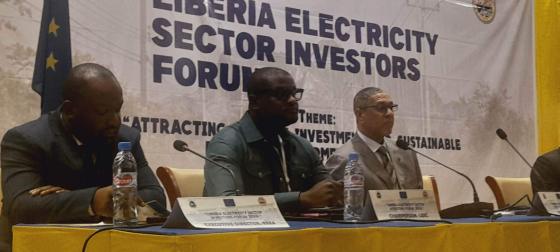Private Sector Investment Key to Sustainable Energy Goal

Scaling up private sector investments in Liberia is "crucial” to ensure that the country has access to clean energy by the end of this decade, says delegates at the country's first investment forum on energy.
The forum, organized with support from the European Union (EU), was intended to send a clear message to the government on what is needed to achieve sustainable energy development, especially through clean, renewable and affordable energy.
At the first-ever Liberia Electricity Sector Investors Forum (LESIF), held December 1-2, at the EJS Ministerial Complex in Congo Town, participants focused on showcasing priority projects in the electricity sector.
The forum also outlined opportunities for private sector investment in the country’s energy sector, including generation, transmission and distribution. The two-day energy investment forum, with the attendance of over 75 local and international investors, sought to encourage private investment for sustainable energy development in the country.
The Minister of Justice and Chairman of the Cabinet, Cllr. Frank Musah Dean, on behalf of President George Weah, said the government's pro-poor agenda aligns with the African Union (AU) Agenda of 2063 and the Sustainable Devellopment Goals. He also said the national program of the government aligned with the vision of the ECOWAS master plan including the 2009 National Energy Policy and the 2015 Electricity Law.
Dean indicated that the 2009 Energy Policy and the 2015 Energy Law address critical national objectives, such as equity, affordability, efficiency, reliability, public acceptability and transparency within the energy sector.
“The government is committed to the implementation of the privatization of the energy sector,” the Minister said. “Together, we can make Liberia a place of better energy efficiency, reliability, affordability, public accessibility and transparency within West Africa.”
Sustainable Development Goal #7, aims to ensure access to affordable and clean energy for all by 2030.
According to a senior official at the Ministry of Mines and Energy, who spoke anonymously, the Liberia Electricity Sector Investors’ Forum (LESIF) is intently organized to erase the perceptions of how difficult it can be to attract private financing in the country's energy sector because of poorly designed energy policies, unstable market frameworks, unclear infrastructure planning, a lack of fiscal incentives, and rule-of-law issues. The person said the two-day forum addressed those so-called barriers.
“In the face of constrained public finance, it is essential to increase private-sector investment in the electricity market to close the access gap,” the Mines and Energy official said.
The Minister of Mines and Energy, Gesler E. Murray, said about US$30 billion is needed to develop a planned electricity and supply infrastructure.
Murray said the private investment initiative aims for the country to have a “resilient system to ensure security and reliability of energy” by 2030.
“Energy is a prerequisite of economic growth and general welfare of the country and its people,” he stressed. “No country is developed without adequate, reliable and affordable energy.”
The European Union (EU) Head of Delegation, Laurent Delahousse, said the EU is happy for its contributions to Liberia’s energy sector and it is time for the private sector to take over.
Delahouse challenged the local and international investors to bring in their ideas, enthusiasm and dynamism to make the sector sustainable and functional.
“The EU has been very supportive in the energy sector of Liberia by providing over 100 million euros under the European Development Fund (EDF),” he said.
The EU contributed to the Mount Coffee Hydropower Plant, and hugely supported the “Monrovia Consolidation of Electricity Transmissions and Distribution Project.”
The EU also pledged 42 million euros to the rural electricity transmission and distribution project.
The Chairman of the Board of the Liberia Electricity Corporation (LEC), Monie Captan, intoned that in line with UN's SDGs, th ECOWAS Regional Policy and the Pro-poor Agenda, the government is committed to 100 percent reliable, accessible and affordable energy by 2030.
Meanwhile, Africa’s current installed energy capacity of 250 gigawatts needs to double by 2030 and increase fivefold by 2050 to meet the continent’s rising energy demand, said Vera Songwe, executive secretary of the U.N. Economic Commission for Africa.
Meeting this decade’s goal requires investments of over US$500 billion, she said, adding that the private sector is “expected to play an important role.”
